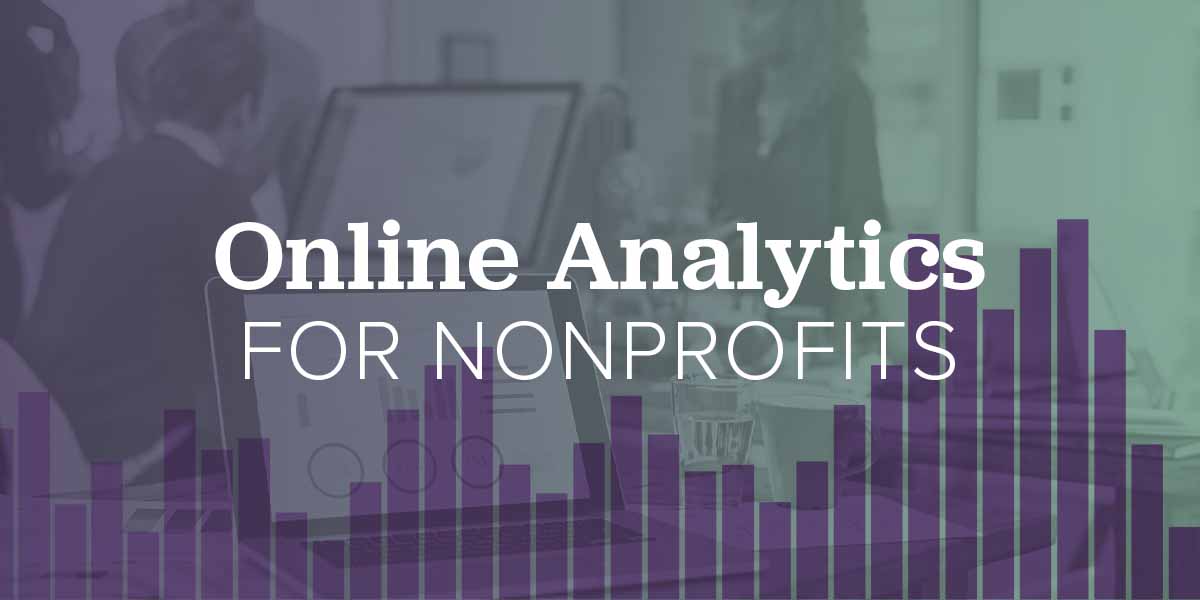Online Analytics for Nonprofits
Nicholas Longtin | April 2022

Throughout my work with nonprofits, I’m continually surprised at how few organizations pay close attention to their online analytics. There’s a wealth of free tools available to collect and leverage analytics data that can help guide critical decisions and shape your nonprofit’s strategy. Keep reading to learn how online analytics can help you raise awareness, get more exposure, attract more donors, and keep your programs full.
Leveraging Online Analytics Data
One major advantage online marketing has over other mediums like print is easily-accessible analytics data that can provide much information about how effective your online communications are. Typically nonprofits are leveraging Google Analytics and have a base understanding of some of the most important metrics, but there are a whole host of other tools available and nonprofits should be looking at much more than just their website metrics.
What Online Analytics Can Do For You
The power of analytics data can’t be understated. Having high-quality data to leverage keeps an organization from making false assumptions that can waste resources, delay important decisions, and hamper your mission. I want to cover just some of the ways I’ve seen nonprofits benefit from a robust approach to online analytics.
Know Your Audience
One very important benefit your organization will get from paying close attention to online analytics is a deeper understanding of your online audience. By understanding how your audience finds you, what content resonates with them, and what actions they are likely to take, you can focus your online efforts to better serve your audience.
Audience analytics can help you:
- Understand how your different audiences behave on different online channels and which channels are worth investing in more
- Determine the content that resonates most with your audience and understand what content is driving important actions like donating or signing up for your newsletter
- Make a plan for growing your audience and bringing much more attention to your mission and services
Spend Your Communications budget Wisely
Most nonprofits are operating on tight budgets and want to maximize the impact they can make with limited funds. Taking the guesswork out of communications strategy is critical to effectively leveraging your budget.
I’ve seen many nonprofits run paid campaigns and not even have conversion tracking set up, meaning they have no idea how effective their ad campaign really was. Online analytics will allow you to put more money towards what’s working and not waste resources on strategies that aren’t paying off.
Analytics can help you budget by:
- Measuring the real effectiveness of online ad spend and determining what ad platforms perform the best for your call to action
- Determining what content drives action and guiding your content spend to produce more impactful pieces with higher ROI
- Mapping your user journey to figure out where people drop off from the path to donation or purchase
Grow Your Mission
Almost all of the nonprofits I work with want to grow their mission and become much more visible in the online space. Online analytics are critical to growing your online visibility and determining how you can stand out from the crowd of other similar nonprofits.
Analytics can help you grow by:
- Understanding how new users discover you online and what keywords bring them to your website
- Discovering your unique online positioning and leveraging it to speak to a more specific audience that resonates with your mission
- Becoming much more visible to potential donors and understanding the online behavior of users that are likely to donate
A More Complete View
Although Google Analytics is an important tool, it tells a limited story about your nonprofit’s online analytics. In the basic Google analytics setup, most nonprofits have only reported on activity happening directly on the website and don’t take into account other important areas of a nonprofit’s online presence. To get a complete picture of your online metrics email campaigns, keyword rankings, social platforms, donation platforms, and custom interactions on your website should all be tracked and reported on.
Thankfully all this data can be collected and leveraged with free tools that provide a complete view of your online communications analytics. This data is invaluable for guiding decision-making and helping your nonprofit grow. Here’s a breakdown of all the online analytics tools every nonprofit should be using.
Google Analytics V4
The main tool for collecting analytics on your website and other online platforms will be Google Analytics V4. It’s important to note that most nonprofits are using Google’s “universal analytics” product which is being discontinued in 2023. You must switch to Google Analytics V4 to retain your website data and reporting capabilities. The big advantage of Google Analytics V4 is it makes reporting across all your online systems much easier and provides user-centric event-driven data that can greatly enhance your ability to leverage data as a nonprofit.
Google Analytics V4 was designed with goals and user actions in mind, meaning it’s much more capable of telling user stories with your data out of the box. These built-in user insights will help nonprofits leverage data better to meet their goals and get a more complete picture of how users interact with all your online systems like your website, donation platform, event website, and more.
Google TAG MANAGER
Google Tag Manager allows nonprofits to track custom website interactions that aren’t automatically tracked by Google Analytics. For instance, if your donate button leaves your website and brings users to a third-party donation platform that click can be tracked and monitored as a goal with the use of a custom event in Tag Manager.
In Tag Manager, you can set up custom tracking for things like video plays, clicks that leave your website, form completions, abandoned form interactions, and more. Tag Manager is an incredibly powerful tool that should be used by every nonprofit.
Google Search Console
Google Search Console isn’t a tool you install on your website like Tag Manager and Analytics. Instead, all you need to do is use one of Google’s verification methods to prove ownership of your website then you can take advantage of this very useful tool. Search Console basically gives you a peek inside the inner workings of Google’s search engine and allows you to access critical information about how Google ranks your website in search results.
With Google Search Console you can access data on how much of your website is indexed, see craw performance and errors, view reports on how often your site shows up in search results, and what keywords people find your website with.
Google Data Studio
Google Data Studio is where all your online metrics come together in one place. Data Studio is a free custom reporting tool that allows users to build highly customized reporting dashboards that bring together a website, social, email, donation, and other custom analytics data.
The majority of my nonprofit clients do most of their reporting and analytics review in Data Studio and rarely log into Google Analytics or Search Console. Why bother pulling reports from Facebook, MailChimp, and Google Analytics separately when you can see it all in one place?
Data Changes Behavior
Something very interesting I’ve noticed is when nonprofits start paying more attention to their online analytics and reporting certain behaviors, it really makes an impact on the organization. For instance, if you pay close attention to the performance of your blog posts and regularly review the analytics, invariably the strategy begins to shift based on the data and after a while, each blog post starts to perform better since the content strategy is based on real data.
There is a saying that “what isn’t measured isn’t managed”, and when it comes to a nonprofit’s online communications strategy I think that holds true.
